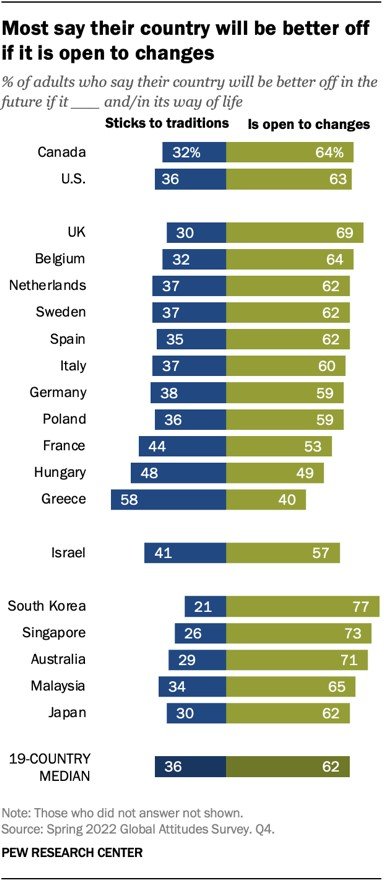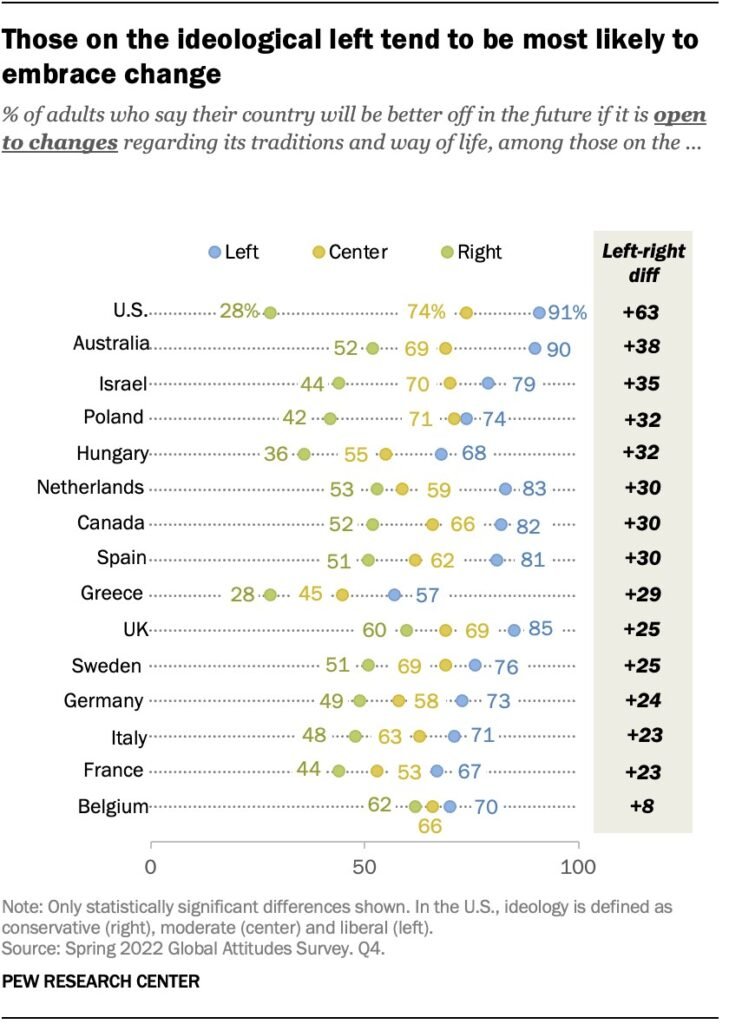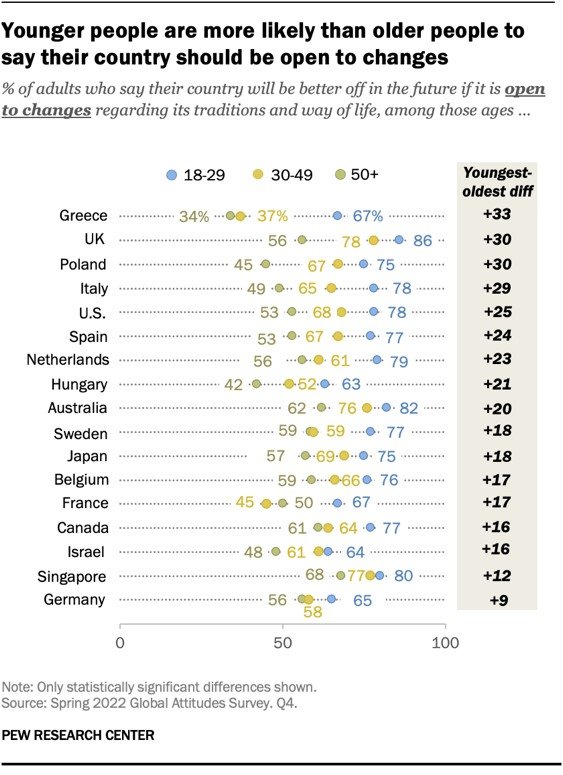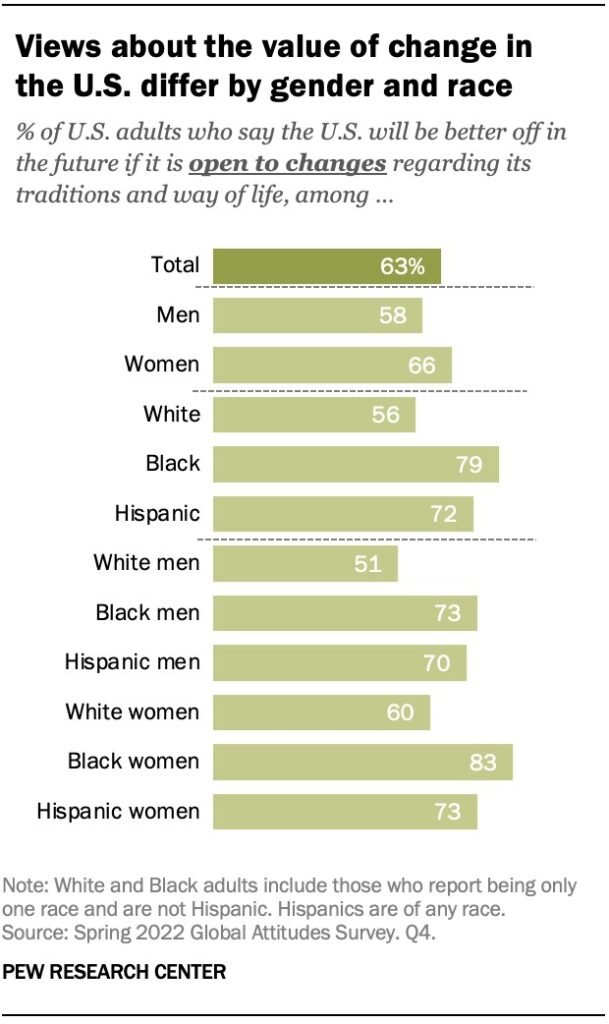The Pew Research Center’s survey in 2022 delved into the global perceptions surrounding the balance between tradition and change in a number of developed countries. The findings shed light on how factors such as ideology, age, education, religion, gender, and ethnicity influence individuals’ perspectives on the future of their nations.
Many of today’s most contentious political debates center on the topic of how different nations should respond to the world’s rapid technological advancements, economic turmoil, and shifting values. To explore this, the Pew Research Center surveyed individuals in 19 developed countries on whether they think their nation will fare better in the future if it maintains its traditions and way of life or if it is willing to adapt to new ideas.
This study was done to explore how people in 19 developed economies throughout North America, Europe, Israel, and Asia feel about the concept of tradition vs change after surveying around twenty-five thousand participants in 2022.
Majority prefer adapting to changes!
Most individuals welcome new experiences. 62% of persons worldwide believe their country would benefit from being more adaptable to new ideas and innovations.
The majority of Europeans believe their nations would thrive if they are receptive to new ideas and reforms, with the exception of Hungary, where opinions are divided, and Greece, where the majority believe that conserving cultural norms is more important.
Seven in ten or more people in South Korea, Singapore, and Australia believe it is beneficial to be adaptable to new situations and ideas.
There are significant demographic and ideological variances on this subject, despite the fact that majorities in most countries prefer being open to changes.

Ideologically left individuals tend to be more likely to embrace change
People who identify with the political left are more likely than those who identify with the political right in the countries where the study was conducted to believe that their country would benefit from being more receptive to change.
Among the countries polled, the divide between liberals and conservatives on this issue is largest in the United States, where 91% of liberals support adaptability while only 28% of conservatives do. Americans who identify as “centrist” tend to agree with liberals on this issue rather than conservatives.

Right-wing populist party backers in Europe are usually unenthusiastic about change. Even among those who have a favorable view of Poland’s Law and Justice party (PiS), only 39% believe their country would benefit by being receptive to new ideas and policies. In contrast, 74% of Poles who have a negative opinion of PiS agree with this statement.
Younger generations are more welcoming towards change
Another important aspect in almost all countries is age. Younger generations are more likely than older generations to believe that their country will prosper if it is willing to embrace cultural and social change. Most notably, in Greece, 67% of those between the ages of 18 and 29 believe their country should be open to change, while only 34% of those 50 and older hold this view.

Education, gender and religion play a role, but differently!
Education also has an impact on how people feel about change. Those who have completed at least some college are far more likely than those who have not to believe that change is good for their country. In Singapore, for example, 80% of people with a bachelor’s degree or more hold this view, but only 62% of those with a high school diploma or lower do.
Religion also plays a role in how people answer this issue. People who don’t identify with any religion are more likely to agree that being adaptable will benefit the future of their country than those who do. This belief is shared by 80% of Americans who do not identify with any religion but is held by only 55% of those who do. In the United States, white evangelicals are especially unlikely to agree with this. Only one-third of respondents believe their country will benefit from being flexible and accepting of new ideas.
In the United States, Canada, France, Spain, Sweden, Australia, and the United Kingdom, men are less inclined to welcome change than women.
What about race?
There is a racial and ethnic divide in American opinion as well. Black and Hispanic adults are more likely than White adults to believe the country will prosper in the future if it is adaptable to change. Even among white men, there is disagreement about whether or not the country would benefit from being more adaptable or more set in its ways.

In conclusion, the study reveals that ideologically left individuals, younger generations, and those with higher levels of education are more likely to support adaptability than following traditions.


